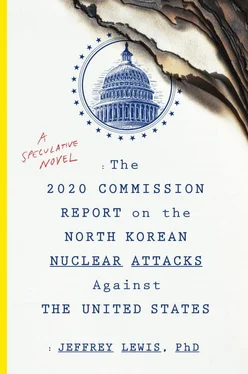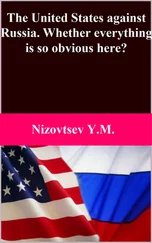Jeffrey Lewis - The 2020 Commission Report on the North Korean Nuclear Attacks Against the United States
Здесь есть возможность читать онлайн «Jeffrey Lewis - The 2020 Commission Report on the North Korean Nuclear Attacks Against the United States» весь текст электронной книги совершенно бесплатно (целиком полную версию без сокращений). В некоторых случаях можно слушать аудио, скачать через торрент в формате fb2 и присутствует краткое содержание. Город: New York, Год выпуска: 2018, ISBN: 2018, Издательство: Mariner Books, Жанр: Фантастика и фэнтези, Триллер, на английском языке. Описание произведения, (предисловие) а так же отзывы посетителей доступны на портале библиотеки ЛибКат.
- Название:The 2020 Commission Report on the North Korean Nuclear Attacks Against the United States
- Автор:
- Издательство:Mariner Books
- Жанр:
- Год:2018
- Город:New York
- ISBN:9-781-328-57391-9
- Рейтинг книги:4 / 5. Голосов: 1
-
Избранное:Добавить в избранное
- Отзывы:
-
Ваша оценка:
- 80
- 1
- 2
- 3
- 4
- 5
The 2020 Commission Report on the North Korean Nuclear Attacks Against the United States: краткое содержание, описание и аннотация
Предлагаем к чтению аннотацию, описание, краткое содержание или предисловие (зависит от того, что написал сам автор книги «The 2020 Commission Report on the North Korean Nuclear Attacks Against the United States»). Если вы не нашли необходимую информацию о книге — напишите в комментариях, мы постараемся отыскать её.
The 2020 Commission Report on the North Korean Nuclear Attacks Against the United States — читать онлайн бесплатно полную книгу (весь текст) целиком
Ниже представлен текст книги, разбитый по страницам. Система сохранения места последней прочитанной страницы, позволяет с удобством читать онлайн бесплатно книгу «The 2020 Commission Report on the North Korean Nuclear Attacks Against the United States», без необходимости каждый раз заново искать на чём Вы остановились. Поставьте закладку, и сможете в любой момент перейти на страницу, на которой закончили чтение.
Интервал:
Закладка:
Kellogg asked Francis what time they should inform President Trump of the North Korean attack. Francis said that they should allow him to continue with his normal routine, as he would on any normal day—that is, to awake around 5:30, turn on the news, and start making telephone calls. Invariably, his first call would be to Francis, who could then ask the president to come down into the SCIF for a briefing. The plan was simply to let the president sleep and try to treat the day as normally as possible, not interfering with his routine. “We saw it on foreign trips all the time,” Francis told investigators later. “When you disrupted his schedule, he got really cranky.”
In the meantime, Francis and Kellogg decided to move to the SCIF at Mar-a-Lago and begin a long, sleepless night of attempting to get ahead of the emerging crisis. Kellogg went there immediately so as to place a call to his South Korea counterpart, Chung Eui-yong. Chung’s office said that he was in a meeting and would call Kellogg back.
Francis, on the other hand, did not go immediately down into the SCIF with Kellogg. Instead, he first stopped by the rooms of the military aides traveling with the president. Among their other duties, these five mid-ranking officers took turns carrying the president’s Emergency Satchel—the bag, also known as the “football,” that contained the communications information that would allow the president to order a nuclear strike.
Francis spoke with each of the aides in turn. Later, he would insist that he was careful not to say anything that might be seen as disloyal or questioning the president’s competence. Instead, he simply informed the officers that the next few days were going to be stressful and that, if the president should ask any of them to do anything unusual, they should check with the chief of staff first.
While President Trump slept and Francis and Kellogg readied for the day ahead, the staff of the State Department Operations Center—the hub that maintains around-the-clock communications for American diplomats—was busy with preparations of its own. Soon, one of the country’s top ambassadors would be working feverishly as well.
The “Ops Center” contacted Nikki Haley, at the time the US ambassador to the United Nations, at 11:22 PM on March 20 to inform her that a South Korean airliner had crashed and later to inform her that North Korea had taken credit for shooting it down. This call began an intense, nightlong period of diplomatic maneuvering by Ambassador Haley. Her diplomatic efforts, conducted in isolation from those of the White House, have come under scrutiny from critics who believe that the chaotic and uncoordinated response by the Trump administration may have allowed the crisis to careen out of control.
When the Ops Center called, Haley had been asleep in her apartment at United Nations Plaza, a residence leased by the Department of State. Haley rarely worked late. Instead, she had made a special effort to maintain a semblance of a normal family life, keeping regular hours, attending her son’s basketball games, and making time to see family.
Haley’s political ambitions, however, had often interrupted her family’s peace. Her campaign adviser when she ran for governor of South Carolina, Will Folks, later alleged that he’d had an affair with Haley during the campaign. She denied the rumors, but many people both in and outside of the US government believed Folks, particularly after he published text messages and phone logs between himself and Ms. Haley. Of particular interest was a list of late-night phone calls, including one that began at 2:24 AM and ended 146 minutes later. Haley was adamant that the lengthy calls were work-related. Folks was, after all, her campaign manager.
Once in office, even uglier rumors about Haley began to spread, owing in no small part to a thinly veiled allegation in a 2018 book, Fire and Fury by journalist Michael Wolff, that Haley was the object of the “special attention” of President Trump. The rumors were not true, and Haley found them disgusting and sexist. Even Folks had said he found them impossible to believe. And yet Haley felt compelled to deny them publicly.
“The worst part,” according to a foreign service officer who worked in Haley’s office, “is that she had to know Trump was the one telling people.” Trump had famously posed as his own publicist to spread rumors to gossip columnists about supposed affairs he’d had with a number of well-known women—including Carla Bruni, the first lady of France, who had been compelled to come forward to deny Trump’s boasts. Aides thought that Haley would have been a fool not to realize that it was Trump himself who was boasting to his friends about what she had done to stay in his good graces, both to boost his fragile ego and to diminish her standing.
As a result of this backbiting, Haley was careful not to do anything that would breathe life into the rumors about the nature of her relationship with President Trump. “Short of a nuclear war,” the foreign service officer explained, “Nikki Haley was not calling Donald Trump after hours.”
Nor did Haley, after learning of the North Korean attack on BX 411, attempt to contact John Sullivan, the acting US secretary of state. Trump, despite his tweet promising a new national security team, had failed to nominate a replacement for ousted secretary of state Mike Pompeo, leaving Sullivan in his second stint as acting secretary.
According to Haley, she did not attempt to contact Acting Secretary of State Sullivan on the night of March 20 because he was traveling. She was “not sure where John [Sullivan] was or what time it was there,” she later told commission investigators, and she did not want to expend valuable time trying to track him down. Others, however, have pointed to a general sense within Haley’s office that Sullivan’s staff was either nonresponsive or unhelpful. Some aides felt that Sullivan remained loyal to ousted secretary of state Rex Tillerson and was openly hostile to Haley, seeing her as ambitious and devious.
The lack of coordination within the State Department was in large part a function of the vast number of senior positions that remained unfilled during the Trump administration—including the top job. The State Department’s Policy Planning Office, which was normally charged with developing long-term strategy, had instead assumed control over day-to-day operations that should have been conducted by assistant secretaries—officials who did not exist because they had never been nominated, let alone confirmed. Even under Tillerson and Pompeo, decision-making would often grind to a halt owing to lack of staffing. “The State Department was like a ghost ship,” one foreign service officer explained.
Still, Sullivan was well liked within the State Department and generally seen as pragmatic and effective. His popularity, however, worked against him with Trump, who saw him as a holdover from Tillerson’s time as secretary of state. Sullivan’s relationship with the president made whatever support he enjoyed from State Department staffers irrelevant and, possibly, counterproductive. “She’s no idiot,” this foreign service officer said of Haley. “Trump thought Sullivan was a swamp guy. He hated those guys so much that the fact that she went around [Sullivan] and humiliated him would be a plus.”
Rather than contacting Sullivan, Haley called her deputy in Washington, Jon Lerner. Lerner had been appointed with no foreign policy experience—he was a political strategist who handled analytics on both of Haley’s campaigns for governor. To the extent that Lerner had a foreign policy outlook, he harbored a general anti-communism that, by his own description, had extended into a broad distrust of regimes that he saw as anti-American. Haley called him “Lemon” because of his dour demeanor.
Читать дальшеИнтервал:
Закладка:
Похожие книги на «The 2020 Commission Report on the North Korean Nuclear Attacks Against the United States»
Представляем Вашему вниманию похожие книги на «The 2020 Commission Report on the North Korean Nuclear Attacks Against the United States» списком для выбора. Мы отобрали схожую по названию и смыслу литературу в надежде предоставить читателям больше вариантов отыскать новые, интересные, ещё непрочитанные произведения.
Обсуждение, отзывы о книге «The 2020 Commission Report on the North Korean Nuclear Attacks Against the United States» и просто собственные мнения читателей. Оставьте ваши комментарии, напишите, что Вы думаете о произведении, его смысле или главных героях. Укажите что конкретно понравилось, а что нет, и почему Вы так считаете.












